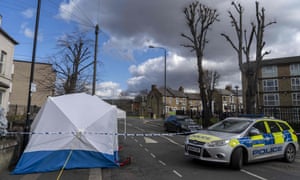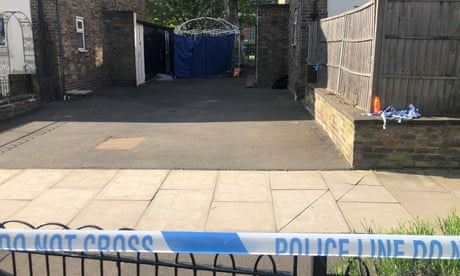I’m a police officer in London. Here’s why we’ve lost control of the streets
I’ve faced the aftermath of knife crime and seen colleagues stabbed. Cuts mean we can’t keep ourselves or the public safe

There’s a saying in the police. It’s not sophisticated or clever, really, and it’s been passed down from generation to generation of coppers; it’s not new. “The job is fucked,” they say. Only now, it doesn’t feel as flippant as it used to.

I’m a police officer in the Metropolitan police, and have been since 2014. I have anxiety and PTSD. I am – and I cannot say this strongly enough – exhausted. I do not feel safe policing London’s streets and, moreover, increasingly I do not feel that people in London are safe. Just last night, there was another double stabbing in east London, resulting in the death of a 15-year-old boy.
It’s all well and good vaguely debating “cuts”, but on the frontline of service, those things have real meaning. In the borough I am stationed in – much like other boroughs – where there is a population of about 250,000 people, there are on average 10 police officers for the entire area to respond to emergency calls per shift. Only two or three of them can drive on blue lights. Crucially, very few staff carry Tasers. With a big incident, such as a stabbing, it’s not unusual to have all of those 10 officers at one crime scene, meaning there is no one else to attend further 999 calls.
I can expect, at the very least, to respond to at least two to three crimes involving knives a month, and that is being generous. Attackers have pulled knives on me. My colleagues – friends – have been stabbed in front of me. I’ve found myself many times kneeling on the pavement holding parts of bodies together. We are simply not equipped: most of the time when a violent crime comes in, it’s only hope that we can depend on. That somehow we can verbally talk a person down from further attacks, or that we can physically overpower them. Or that, miraculously, an officer with a Taser turns up.
There has been, as evidenced by the recent and continuing knife-crime debate, a steep upturn in the amount of calls we attend that involve a blade or even a gun. I don’t mind admitting I’m scared going out on these jobs. I realise it’s part of my duty as a police officer, but the trouble is, I no longer feel we’re in control.
The 20,000 frontline cuts don’t even begin to cover the reality. Theresa May also sanctioned cuts to civilian staff, ambulance services, crisis teams, call handlers and the people we rely on for intelligence – such as knowing if someone has committed previous crimes, whether they involved a weapon and therefore how prepared we should be. Our duties are being stretched beyond our capabilities to include non-criminal matters regarding mental health and social services, because cuts have debilitated those sectors too.
While on-foot patrols are dangerously diminished, police officers are sent to help the mentally ill, often sitting for hours with people who are a danger to themselves. Should we try to section them, it can take even longer to locate a single bed, so we often end up at the other side of London, away from our borough. Frequently the person is then released an hour later, deemed to be fit, and we get another call from them the following night, at the same address, to deal with the same issue all over again. The system is broken.
As for our own mental health, there isn’t really time to recover. You’re expected to go straight out on to the next job, sometimes on the same night, even if a situation is debilitating. If you’re lucky, you’ll get an inspector or a sergeant who’s half decent, and asks how you are. Often you think you’re all right for a while. But it takes its toll eventually. I have PTSD from particular jobs – I get panicky, and I’ve had periods of intense flashbacks – but when I asked my GP about being referred for help, he said I had to go through occupational health. I’ve been waiting for more than six months.
On top of all this, numbers are dwindling because police officers no longer have faith. People who have been in the force for 20 years – just 10 years before they qualify for a pension – are leaving. We feel ignored and maltreated by the government, pushed to the brink of exhaustion and our mental capacities.
When I first joined the force, stop and search was something that we were told to avoid unless we were absolutely certain there was a proper and solid reason to conduct it. For example, smelling weed being smoked wouldn’t be enough of a reason to search someone. Now, unofficial targets mean that if an officer hasn’t performed a stop and search for, say, two weeks, they are being hauled in front of chief inspectors and bollocked. This change – pressure being put on us to meet certain numbers – is not about safety: it’s about politics. And policing should never be politicised like that.
It feels like the organisation just doesn’t care about the officers, the pressure they are being put under or, as a result, the public. Our normal shift pattern is six days on, four days off. Often that would be seven days, so that we can do training or follow up on crimes. We don’t get that day now to follow up – instead we’re making up teams in other boroughs. So the service that we’re actually able to provide to the public, in terms of reporting your crime, is shocking. We have no faith in the government. Not many people have had the balls to stand up for the police and say that this is wrong; this is unacceptable; this is dangerous. That’s what needs to happen now. But it won’t, because of Brexit. Our annual leave is in lockdown because of the anticipation of a rise in violence after we leave the EU. For years, people inside and outside the force have been saying that policing is on the brink of collapse. The mood now is that we are no longer on the brink. We have gone over the edge. The job is fucked.
• The anonymous writer is a police officer in the Metropolitan police

4 responses to “2019 – 022 I’m a police officer in London. Here’s why we’ve lost control of the streets”